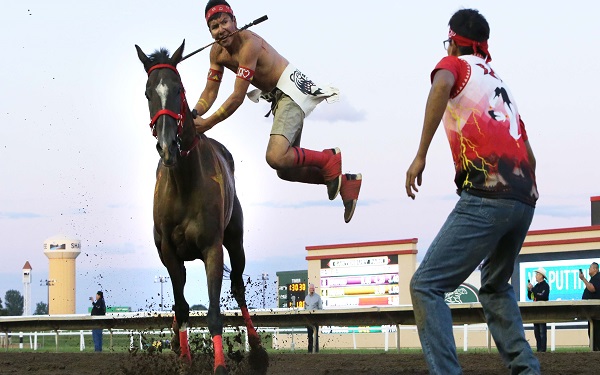BY JIM WELLS
His dreams have always been about horses. As a young boy, that is what filled his head as he slept. The affinity he found in sleep for horses shaped his manner of handling them during his waking hours
He always uses his voice and hands, never an instrument of pain to communicate with horses, to elicit the responses he wants from them. A soft hand and soothing voice are all he has ever needed.
He cautions that he is not a whisperer, simply a man following the edicts of his dreams.
His rider, who happens to be his son Jace, uses no whip, only the encouragement of his legs, hands and voice to guide his horse during relay events, for the Long Feather team.
Richard Long Feather, a member of the Standing Rock Sioux tribe, is the captain of of the Long Feather team competing in Canterbury Park’s Indian Relay Races this week, and a man who stills sees horses as he sleeps.
He has a special way with them, as did many of his ancestors with whom he shares other similarities. He is fluent in Lakota, the language of his grandparents, who raised him, and others whose names are still spoken with respect and reverence in his villages.
He was born not far from what once was Sitting Bull’s camp. The Hunkpapa chief spoke Long Feather’s language as did another famous Lakota leader, Crazy Horse, from the neighboring Oglala tribe on the Pine Ridge Reservation.
The language has not changed, and he would easily talk with those famous Lakota leaders if they still walked the earth. Lakota does not differ much from Dakota, the dialect spoken in Minnesota, or the third branch of the Sioux language, Nakota.
“For example,” Long feather said. “The name Luke (if it existed) in the Lakota language would be spoken as Duke in Dakota.”
L for Lakota, D for Dakota, N for Nakota. The three dialects of the Great Sioux Nation.
Relay racing got under way with Thursday night’s card and will continue Friday night with the finals on Saturday evening.
Canterbury Hall of Fame rider Derek Bell after watching the first heat on Thursday had a terse remark on what he had just witnessed. “Those guys are amazingly fit,” he said, shaking his head. Three times around the track on three different horses, three miles in total.
The Abrahamson team from the Colville Confederation in Washington state won the first heat, in which Long Feather competed, finishing in front of Young Bear Express, the leader for a mile or more of the three-mile chase.
The second heat went to Little Badger, captained by Jostin Lawrence. The rider, Chris Carlson, celebrated afterwards in the winner’s circle, reaching down to take his month and one-half old daughter, Alani, onto the horse with him as his three-year-old daughter Alaysia looked on.
Little Badger, from the Blackfeet Nation in Montana, outdueled two-time Canterbury champion Tissidimit, from the Shoshone Bannock tribe in Idaho.
Long Feather, 54, rode himself as a younger man and has competed in races for older racers as well. He is every bit as ready now to convey stories about his culture and its language as he is to discuss the racing that occupies him and his two sons, Jace and Jestin, the team’s set-up man. Tylee Cadotte, girlfriend to Jace, is the team’s back holder.
He tells the story, for example, about the tribal member generations ago who heard singing that drew him into the Valley of the Mountain, where he expected to find a melodic human being but instead discovered that an Eagle was doing the singing. The song was a message to Long Feather’s people that the eagle and the Indian would one day become symbols on American money and elsewhere in that culture.
Long Feather enjoys traveling with his family to races at various locations in the West and, now, in the Upper Midwest, in Shakopee. He participated at one time in the compilation of a dictionary of the Lakota language, a reference guide still in use.
He occasionally gets upset with some of his friends. He will begin a discussion in Lakota, only to have them switch to English.
Still, he is dedicated to preserving the language of his people, and the treatment of horses, as he learned to handle them at night, while he sleeps.
…………………………..
Indian Horse Relay continues Friday and Saturday at Canterbury Park.
